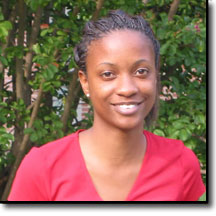|  Karitsa Williams
Karitsa Williams
email: kgwilliams@mail.ecsu.edu
Mentor: Dr. S. Raj Chaudhury, NSU
Internship: Digital Earth Group. REESS Summer Internship
Program, Norfolk State University
Title: Disaster Agency Readiness: Predicting And
Preparing For El Nino, La Nina Southern Oscillation (ENSO),
And North Pacific Oscillation (NPO)
Digital
Earth is a program created by Vice-president Al Gore to view
vast quantities of geo-referenced data on a multi-resolution
3-dimensional representation of the Earth. This program was
designed to offer mass amounts of data to the public in a
user-friendly format. The program is designed to teach through
easy-to-use classroom modules. To demonstrate the usefulness
of this program, we used satellite data to show/predict trends
in El Nino Southern Oscillation (ENSO). We created a user-friendly,
classroom ready module that will make this data easier to
understand. El Nino Southern Oscillation (ENSO) is a disruption
of normal atmospheric flow patterns in the tropical and southern
hemisphere areas of the Pacific Ocean. ENSO can create substantial
changes in sea-surface temperatures (SST) of the eastern and
central equatorial Pacific. The ability to predict El Nino
trends will have great societal and economical impacts. These
impacts include increase awareness of environmental destruction
and a decrease in economic loss. In order to create a working
module for students and faculty to use, we utilized information
on ENSO, North Pacific Oscillation (NPO), El Nino/La Nina,
sea-surface temperature (SST), vegetation index data, and
Heavy Precipitation Frequency (HPF) data. Also by using this
information we searched for trends that will help us to determine
whether the year to come will have an El Nino or a La Nina,
high or low NPO, and high or low HPF. We also presented our
findings in an easy to understand multi-dimensional model.
|

